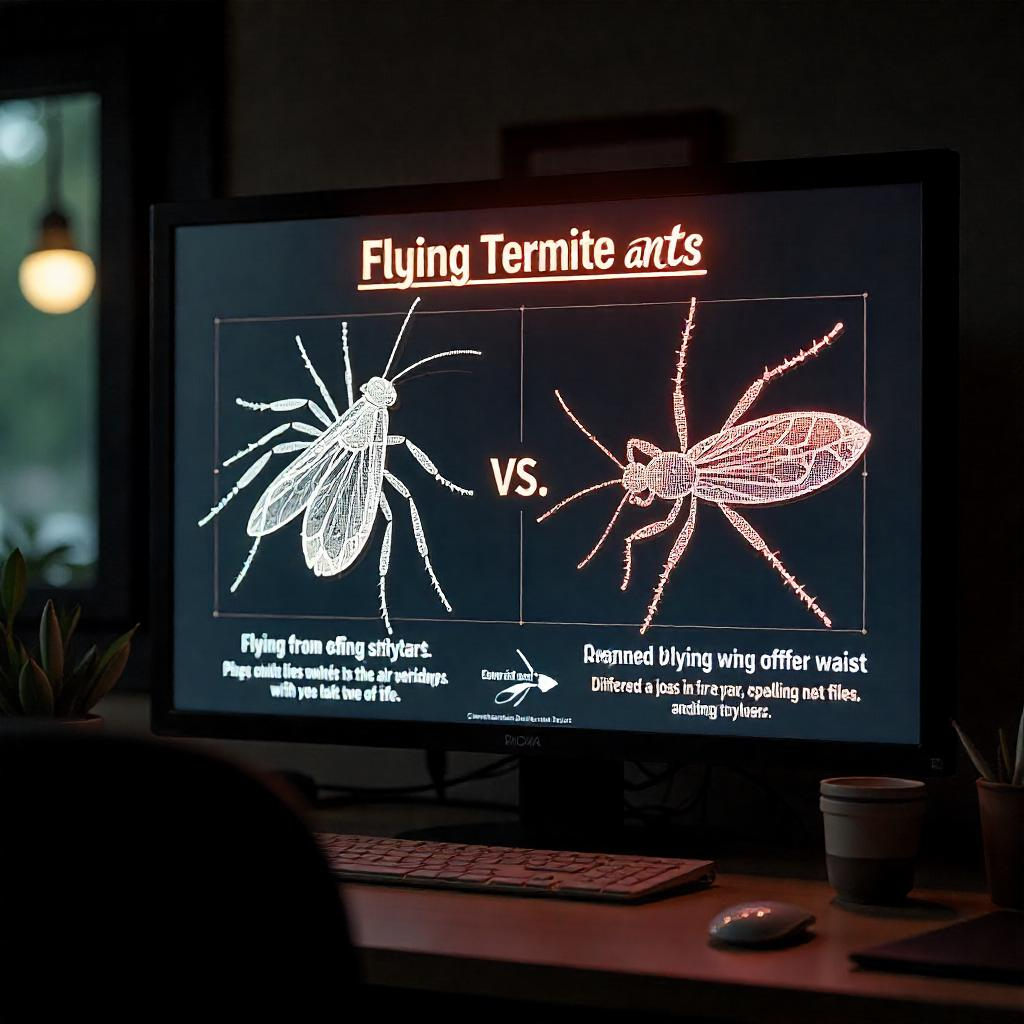Flying insects can evoke a mix of curiosity and concern, especially during their swarming seasons. For residents of Delhi NCR, spotting winged insects around your home often raises alarm bells about potential infestations. Are they harmless flying ants or destructive flying termites? It is crucial to know the difference because while flying ants are generally harmless, flying termites pose a serious threat to your property.
This blog will help you learn how to identify flying termites versus flying ants, understand the risks termites bring, and provide actionable advice to prevent and handle infestations effectively.
Flying Termites vs. Flying Ants
Flying termites and flying ants may appear similar at first glance. However, there are distinct characteristics that can help you identify them accurately. Here's how to differentiate them based on their physical features and behaviour:
1. Body Structure
Flying Termites
Termites have a straight, tube-like body with no distinct waist. They appear broad and uniform throughout.
- Flying Ants
Ants exhibit a segmented body with a pinched waist separating the thorax and abdomen, giving them a defined structure.
2. Antennae
- Flying Termites
Termites have straight, uniformly shaped, bead-like antennae.
- Flying Ants
Ants are easily recognisable by their bent or elbow-shaped antennae.
3. Wings
- Flying Termites
Both pairs of termite wings are of equal size and are translucent with delicate veins. These fragile wings are also shed easily.
- Flying Ants
Ants have two pairs of wings, but their front wings are significantly larger than the hind ones. Their wings are firmer and not easily detached.
4. Color
- Flying Termites
Usually pale or light brown.
- Flying Ants
Typically dark brown or black, making them appear more prominent.
5. Swarming Behaviour
- Flying Termites
Termites swarm in warm, humid conditions, particularly after monsoon rains in Delhi NCR. Their appearance often points to a nearby colony, which can threaten a property’s structural integrity.
- Flying Ants
Flying ants swarm for mating purposes and typically vanish after a short period. They pose no structural danger.
Why Flying Termites Are a Serious Concern in Delhi NCR
While flying ants can be a temporary nuisance, flying termites present a long-term and severe threat to both homes and businesses in Delhi NCR. Here’s why:
Perfect Breeding Conditions
Delhi NCR’s warm temperatures, high humidity, and frequent monsoon rains create an ideal environment for termites to thrive.
Structural Damage
Termites feed on cellulose, which is a key component of wood and similar materials. Over time, they can cause irreversible damage to walls, ceiling beams, furniture, and even a building's foundation.
Colony Expansion
Flying termites indicate the presence of a parent colony nearby. They are reproductive termites that are actively looking to establish new colonies, escalating the damage potential significantly.
How to Handle Flying Termite Infestations
Once you spot flying termites, immediate action is essential to mitigate potential risks. Here’s how to tackle an infestation effectively:
1. Conduct a Property Inspection
Begin by identifying termite activity, which may include:
- Mud tubes along walls or furniture.
- Hollow-sounding wooden structures.
- Discarded termite wings around windows, doors, or other entry points.
Swarming termites, especially after dark, are a strong indicator of a nearby colony.
2. Identify the Colony
Locating the parent colony is crucial. Infestations often originate underground or in hidden crevices. Professional pest control services in Delhi NCR can better assess and locate colonies for effective eradication.
3. Seek Professional Pest Treatment
DIY termite solutions may provide short-term relief but seldom address the root of the problem. Expert services like Skuas Pest Control offer comprehensive termite management using eco-friendly treatments designed for Delhi NCR's unique climatic conditions.
Pro Tip: Invest in an anti-termite reticulation system, a long-term barrier designed to protect properties from termite infestations.
4. Adopt Preventative Measures
To reduce future risks:
- Seal gaps and cracks in walls, doors, and windows.
- Fix leaky pipes to prevent moisture build-up, which attracts termites.
- Ensure good ventilation in basements and crawl spaces.
- Store wood piles and paper products away from your property’s foundations.
Tips for Managing Flying Ants
Although flying ants are not destructive, their presence can still be inconvenient. Here are a few easy steps to make your property less welcoming to them:
- Maintain Cleanliness: Ensure surfaces are clean and free of food crumbs, especially sugary or greasy residues.
- Close Access Gaps: Use sealants or caulk to block entry points.
- Natural Deterrents: Substances such as white vinegar, lemon juice, or cinnamon are effective non-toxic repellents.
When to Call Professional Pest Control Experts
The sooner you act, the easier it will be to address flying termites or ant infestations. Here’s when you need professional help:
- You notice frequent swarms or discarded termite wings indoors.
- Damage to wooden furniture or walls becomes apparent.
- DIY methods fail to provide relief or the infestation resurges.
For residents in Delhi NCR, Skuas Pest Control offers tailored pest control solutions. Whether termites, ants, or other pests, their certified experts use advanced technologies and eco-friendly methods to keep properties safe.
Schedule your free inspection today by calling +91 9316666656 or visiting their website
Take Action Before it’s Too Late
Being able to identify flying termites versus flying ants can protect your property’s integrity and save thousands in potential repairs. While flying ants are generally harmless, flying termites demand immediate attention due to their destructive potential.
Whether it’s detailed inspection, eco-friendly pest treatments, or long-term preventative measures, professional pest control services will ensure the safety and longevity of your property.
Don’t wait for the damage to spread. Contact Skuas Pest Control now at +91 9316666656 for safe, reliable, and efficient solutions tailored for properties in Delhi NCR.

